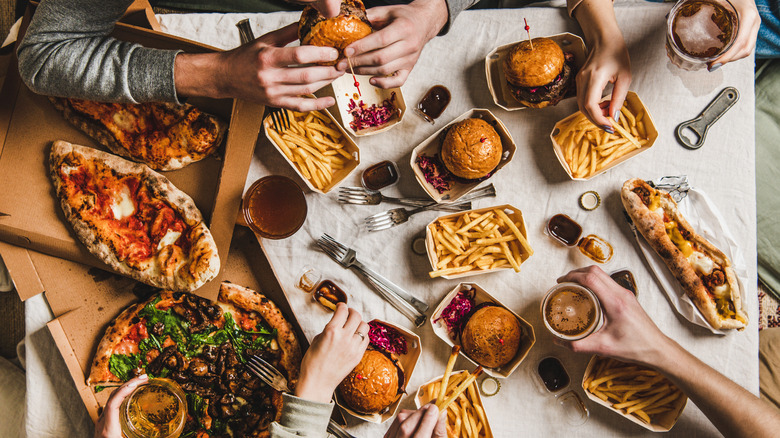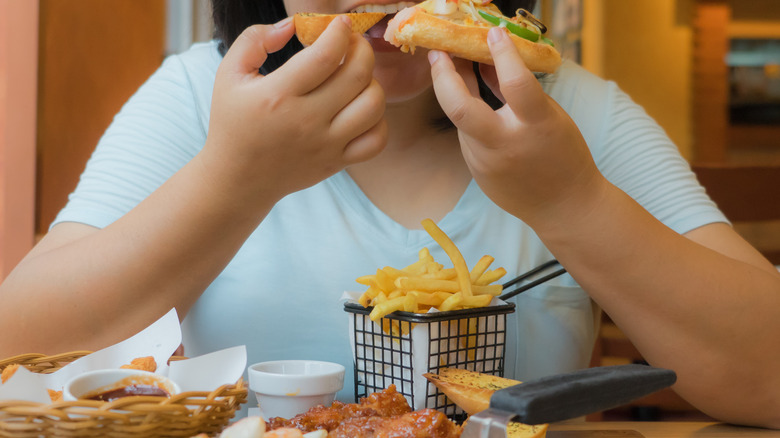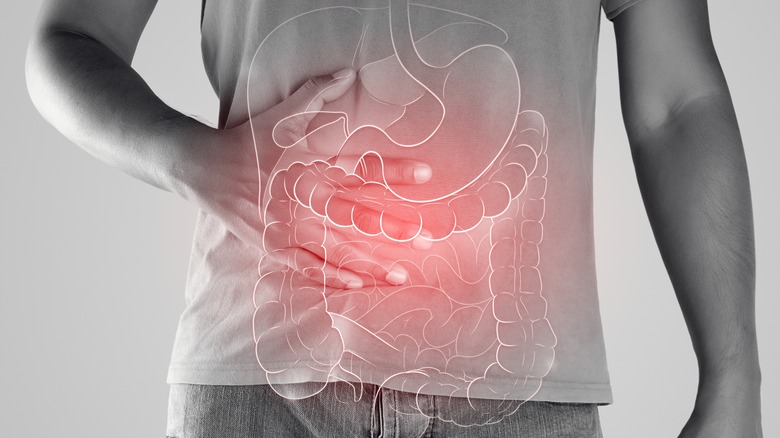When You Always Eat Until You're Full, This Is What Happens To Your Body
Let us know if any part of this sounds familiar: You've just finished a delicious 3-course meal at your favorite restaurant, and you feel like you can't possibly eat another bite. But right after that scrumptious spread, you head to the theater to catch a movie — and as soon as you smell the popcorn, you feel the urge to get yourself a bucket. Fact is, you're no stranger to overeating. Stuffing your face at the Thanksgiving table — well, that's a given. You were also part of the "Clean Plate Club" as a kid, which basically meant no dessert until you ate everything on your plate. Now that you're a parent, you often find yourself eating leftover food on your kid's plate so that none of it goes to waste.
With that said, how much eating is too much eating? According to the National Institute on Aging, that depends on the person's age, gender, height, and activity level. The effects of regularly eating beyond fullness can range from short-term discomfort like gas, bloating, and indigestion to chronic health conditions and diseases like type 2 diabetes, heart disease, and stroke (via Healthline).
Occasional overeating is normal and usually not a cause for concern, but if you find yourself gorging on the regular, take heed. Read on to learn what happens to your body when you regularly overeat, what to do if you overeat, and tips on how to stop overeating.
Your body gets used to eating more than you need to
Fun fact: The average adult stomach can typically hold about 1 liter or 4 cups of food, but can stretch to hold up to 3 to 4 liters or 1 gallon of food (via Piedmont Healthcare). That's a lot of food.
Even though it feels like it's going to burst after overeating, your stomach will return to its normal size thanks to the rugae (per Colorado State University). These folds line the belly, allowing it to expand and contract to accommodate incoming food. So, while your stomach won't permanently stretch out, it will get used to expanding beyond what you need — which, unfortunately, may keep you in a cycle of overeating.
According to WebMD, an imbalance of ghrelin and leptin, known as the hunger hormones, may also contribute to overeating. Leptin is the hormone that decreases your appetite, while ghrelin is a hormone that increases it. A person's leptin levels increase as they gain more weight. Obesity expert Dr. Mary Dallman from the University of California at San Francisco says that many obese people have developed a resistance to leptin, which is the appetite-suppressing hormone.
Your body goes into overdrive
Your digestive system starts preparing itself as soon as you see or smell food, before you even put a bite in your mouth (via Gastrointestinal Specialists). When you start eating, enzymes begin to break down the food, and blood flow increases to the stomach to help with digestion. Your stomach stretches, sending signals to the brain, and hormones are released to let you know when you're full. But eating beyond fullness makes your digestive system work even harder, which can have some unpleasant consequences.
Overeating causes your stomach to push against other organs in an already crowded abdominal area, making you feel uncomfortable, gassy, and sluggish (via MD Anderson Cancer Center). In addition, your body ends up needing to make extra hormones and enzymes to digest the food. The hydrochloric acid produced in your stomach to break down the food may back up into your esophagus, causing acid reflux and heartburn. As your heart rate goes up, you may feel hot or dizzy as more blood is sent to your gut to help digest the food.
You'll store excess fat more easily
Fact: If you eat more calories than your body can use, you gain weight. According to Erica Kannall, a registered dietitian and certified health/fitness specialist with the American College of Sports Medicine, your body uses calories from fat, protein, and carbohydrates as energy, and stores the excess as fat (via SF Gate).
Regular overeating causes weight gain and increases your body's ability to store more fat. In a study published in Applied Physiology, Nutrition, and Metabolism, just one week of overeating can affect insulin sensitivity and increase your body's fat storage capacity. With that said, it's not only how much you eat, but what you eat that can affect how much excess fat your store. Per SF Gate, roughly 2,000 extra calories from carbohydrates can be converted into glycogen and stored in the muscles, liver, and blood. When you've maxed out your glycogen storage capacity, your body stores the excess calories from carbohydrates as fat.
According to a study in the International Journal of Exercise Science, excess calories from fat and starchy and refined carbs are responsible for most excess fat storage. Meanwhile, a study in JAMA found that eating more protein helped increase lean body mass and resting energy expenditure. This means that by eating more protein, you can help your body become leaner and burn more calories, even when you're lying still. Still, regardless of whether excess calories come from carbohydrates, fat, or proteins, regular overeating leads to increased fat storage.
You'll feel sluggish and tired
Postprandial somnolence, also known as the afternoon slump or a food coma, is that tired, groggy feeling we get after eating a meal, especially when we overindulge. But that sleepy feeling isn't just caused by how much you eat. It can also be caused by what and when we eat (per Cleveland Clinic).
We've all experienced that feeling of being unable to stay awake after Thanksgiving dinner. That's because it takes the body a lot of time and effort to digest a large meal. More blood flow is diverted to the gut to help digest the food, resulting in a woozy, food-drunk feeling (per The Conversation).
Eating a meal heavy in refined carbohydrates and protein packs a one-two punch by increasing our levels of tryptophan (an essential amino acid in foods like chicken, turkey, milk, and cheese, which are high in protein) and serotonin. Refined carbohydrates like bread, pasta, and baked goods can dramatically increase your blood sugar level. If your body can't metabolize it all, it can lead to that tired, can't-keep-your-eyes-open feeling (per Cleveland Clinic).
Your sleep quality declines
Overeating can make you doze off, but you might be unable to stay asleep. According to the Cleveland Clinic, eating a large meal or eating late in the evening or just before bedtime affects the quality of your sleep by causing indigestion and heartburn and disrupting the circadian rhythm, your body's internal clock. The later at night you eat, the harder it will be for you to stay asleep (per MD Anderson Cancer Center).
In a recent study published in the journal Science, Northwestern Medicine discovered that circadian rhythm disruption caused by late-night eating and overeating also affects your fat tissues. According to the study, our metabolism is time-sensitive and more robust during daylight than nighttime hours.
To avoid sleep disruption and weight gain, Alexis Supan, RD recommends waiting at least three hours after eating before sleeping (per Cleveland Clinic). This gives your body enough time to digest the food and avoid getting an upset stomach or heartburn.
You may experience digestive issues
Per the Cleveland Clinic, hunger is just one of the many reasons we eat. There's also the evolutionary aspect: In prehistoric times, humans ate as much as possible when food was plentiful in the summer and fall to prepare for the winter when food was more scarce. Where we live, our cultural background, family traditions, and economic status can also play a role in what we eat. Eating is a way we socialize, celebrate, and comfort ourselves. Sometimes we eat to entertain ourselves. Other times we eat just for the taste. With that said, overeating can lead to some serious tummy trouble, regardless of the reason.
According to Healthline, chronic overeating can lead to various uncomfortable and embarrassing digestive issues—Not fun. Overeating can cause indigestion and nausea. If left untreated, it can lead to vomiting. Overtaxing your digestive system can cause gas and bloating, especially when overeating spicy or fatty foods, which can be uncomfortable and embarrassing.
When your stomach reaches maximum capacity, it can cause the hydrochloric acid used to break down food to splash up into the esophagus resulting in heartburn or acid reflux. Your expanded stomach pushes down on the other abdominal organs, making your stomach stick out, causing a "food baby" (per MD Anderson Cancer Center).
Increased risk of infertility
The extra weight we carry from overeating can affect fertility, making it more difficult to conceive. According to a study published in The Journal of Clinical Endocrinology & Metabolism, overweight or obese women were more likely to develop polycystic ovarian syndrome (PCOS), one of the leading causes of infertility. Overweight women, particularly those who carry their excess weight in the abdominal area, are also more likely to experience hormonal issues that can inhibit ovulation, says the Cleveland Clinic.
Overeating can cause infertility issues in men as well. A study published in JAMA by the Harvard School of Public Health found that "overweight and obese men were more likely than their normal-weight peers to produce lower numbers of sperm, or even no sperm." Carrying extra weight can also cause hormonal imbalances in men resulting in increased estrogen levels and decreased levels of inhibin b and androgen, which are hormones that produce sperm. It also increases body temperature, particularly around the scrotum, which can affect sperm strength, count, and production (per Penn Medicine).
Increased risk of metabolic or insulin resistance syndrome
Sometimes, we eat past fullness while we are distracted, watching TV or scrolling though social media. Overeating may also happen because we're stressed, tired, bored, or pressured to eat more. Sometimes, we wait too long to eat, causing us to eat more than we normally would. Some foods are so addictive that we literally can't stop ourselves from eating them. We may also overindulge in certain foods because we only have them during the holidays or on special occasions (per Tufts University). Sadly, when your overeating becomes more frequent, there's a good chance your overall health will suffer tremendously.
The National Heart, Lung and Blood Institute (NHLBI) defines metabolic syndrome, also known as insulin resistance syndrome, as "a group of conditions that together raise your risk of coronary heart disease, diabetes, stroke, and other serious health problems." According to the NHLBI, if you have three or more of the following conditions, you may have metabolic syndrome: excess abdominal fat, high blood pressure, high levels of blood sugar, triglycerides, and LDL cholesterol, and low levels of HDL cholesterol.
Metabolic syndrome can also increase your risk of developing polycystic ovarian syndrome (PCOS), fatty liver, and gallstones (per Johns Hopkins Medicine). Luckily, most metabolic syndrome causes are lifestyle-related and can be reversed, according to the NHLBI.
Increased risk of certain types of cancer
According to the Centers for Disease Control and Prevention, being overweight or obese can increase your risk of developing the following types of cancer: breast, colon, esophageal, gallbladder, kidney, liver, meningioma (in the brain), multiple myeloma (in white blood cells), ovarian, pancreatic, rectal, stomach, thyroid, and uterine.
A study published in the CA: A Cancer Journal for Clinicians stated that being overweight or obese accounted for cancer in "7% or 8% in some high-income Western countries and in Middle Eastern and Northern African countries," with women bearing the brunt of it with over two times more cases.
How does fat cause cancer? It's believed that fat cells, hormone imbalances, increased levels of insulin, and DNA damage caused by oxidative stress may trigger some of these cancers. As with metabolic syndrome, some of these cancers can be prevented by making healthy lifestyle changes (per the National Cancer Institute).
Off-balance hunger regulation hormones
There's an expression, "Eat to live, don't live to eat." It's sound advice, but that might be easier to do if we only ate when we're actually hungry, and not when we think we are.
Ghrelin and leptin are the hormones responsible for regulating hunger (per Healthline). In the simplest terms, ghrelin signals your brain when you're hungry, and leptin lets your brain know when you're full. But regularly overeating, particularly highly addictive foods that contain lots of fat, salt, and sugar, causes your hunger and satiety queues to become out of whack.
According to a study published in the journal Frontiers in Psychology, when we eat these highly addictive foods, dopamine, the feel-good hormone, is produced and activates the reward and pleasure centers of the brain. If we continue to eat these types of foods on a regular basis, the dopamine will decrease our satiety queues and lead to leptin resistance — and subsequently, a cycle of overeating and weight gain.
Your memory may decline
While some memory loss is expected with age, overeating may hasten that decline, particularly in older adults. According to a study published in Neurology of Disease, the increase in body fat and the imbalance of insulin in the blood and bacteria in the intestines contribute to the narrowing of vascular arteries leading to decreased blood flow to the brain. In another study published in the Scandinavian Journal of Psychology, semantic or long-term memory was reduced in overweight adults.
According to the American Heart Association, being overweight may also increase your chances of developing dementia. In a brain imaging study published in the Journal of Alzheimer's Disease, researchers stated, "As a person's weight goes up, all regions of the brain go down in activity and blood flow" (per Science Daily).
What we eat also affects brain function. According to Harvard Health, people eating a diet high in sugar and processed foods showed a decline in brain function.
Increased risk of depression
It may come as no surprise, but overeating can negatively impact your mental health (per Healthline). Who hasn't experienced guilt or remorse after overeating or eating something "bad" for you? According to a study published in the Frontiers of Psychology, overweight people have an increased risk of developing depression and anxiety. The risk of depression doubles if they also have diabetes. The same study states that depression and overeating are a two-way street: Overeating can lead to depression, and depression can lead to overeating.
Meanwhile, a study published in the Frontiers of Psychology says that low levels of leptin — the hormone that suppresses a person's appetite — have been associated with depression and major depressive disorder. Plus, aside from how much we eat, what we eat also affects our mood. Eating a diet high in processed foods and sugar can make your symptoms of depression worse, says Harvard Health.
If you or someone you know needs help with mental health, please contact the Crisis Text Line by texting HOME to 741741, call the National Alliance on Mental Illness helpline at 1-800-950-NAMI (6264), or visit the National Institute of Mental Health website.
What to do if you overeat
Despite your best efforts, you overdid it again at dinner. What can you do to relieve the gas, bloating, and discomfort that comes with overeating? According to Healthline, herbal teas such as peppermint, chamomile, and ginger can help keep you hydrated, reduce stomach acid and nausea, and relieve constipation. So can drinking warm water with half a teaspoon of baking soda or a squeeze of lemon juice. Sucking on ginger or peppermint candy can also help reduce stomach acid.
Even though you feel like taking a nap, get moving, but nothing crazy (per Piedmont Healthcare). Taking an after-dinner walk can help rev up your digestion and get things moving. Taking a probiotic supplement may also help you digest your meal. Also, while it may sound counter-intuitive, plan your next meal. Resist the urge to skip meals to "make up" for all the calories you consumed, or give up altogether since you blew your diet. Eat something easy to digest, like soup, and plan healthy meals that include a balance of lean protein and healthy carbs like fruits and vegetables.
Tips to avoid overeating
Rather than dealing with the weight gain and indigestion that comes with overeating, why not skip overeating altogether? Mindful eating — or "developing awareness of your experiences, physical cues, and feelings about food" — may help (via Healthline).
To start practicing mindful eating, remove distractions during mealtimes. A study published in The American Journal of Clinical Nutrition shows that mindlessly eating, say while watching television or scrolling through social media, increases the amount of food we eat by distracting us from our satiety queues.
Eat slowly and savor your meal. Look at and smell the food on your plate before you take a bite. Notice the food's taste, temperature, and texture in your mouth. Chew it thoroughly. Put your knife and fork down between bites. A study published by BMJ Open Diabetes Research & Care showed that the slower pace reduces the amount you eat by giving the stomach enough time to signal the brain that it's full.
The Cleveland Clinic recommends that you find your hara hachi bu point, a Japanese phrase pertaining to eating up to 80% capacity. But what does "80% full" feel like? According to Psychologist Susan Albers, PsyD, you should feel satisfied and no longer hungry, but not so full that you can't eat another bite. It may take some practice, but she recommends starting by leaving one bite of food on your plate.















